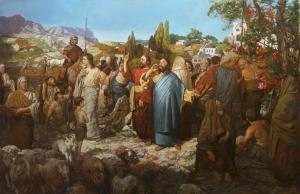Simone Weil once observed in a notebook entry that “the stories of miracles complicate everything.” She’s right about that, but she could have replaced “stories of miracles” with “Jesus’s parables” and her statement would also have been true. A section of one of my sabbatical book chapters works through a few of the parables in Matthew’s gospel and draws out some of the complicated meanings just below the surface of what appears to be the “obvious” meaning of the story.
Consider, for instance, the parable of the vineyard owner in Matthew 20 who pays each of the laborers in his vineyard the same daily wage regardless of whether they have worked for an hour or all day. My students observe that this guy is acting like a socialist. Jesus observes at the end of the story that “the last will be first, and the first will be last.”
Compare that parable with last Sunday’s parable of the talents from Matthew 25, in which a very rich man goes on a journey and leaves a bunch of money with three different servants to take care of while he’s gone. Upon his return, the master rewards the two servants who have doubled the amount left with them, but gets very angry with the third servant who buried the treasure entrusted to him so he wouldn’t lose any. The master takes the money from the timid slave, gives it to the other two slaves, then orders that the loser slave be “thrown into the outer darkness, where there will be wailing and gnashing of teeth.” For, the master observes, “to all those who have, more will be given . . . but from those who have nothing, even what they have will be taken away.”
So which is it? Will the last be first and the first last, or will the little that the last have be taken away from them and given to the first who already have enough? It would take a skilled homilist to draw a consistent message from these two parables–I’m not sure it can be done. I was told as a child that Jesus told stories so that everyone could understand his message, but many of the parables are followed by the disciples telling Jesus that they have no idea what he’s talking about. I don’t blame them.
I recently had the opportunity to observe one of the best preachers I’ve ever encountered tackle a parable that’s even more challenging than the stories of the vineyard owner and of the talents. The final session at the Evolving Faith conference that Jeanne and I attended in Minneapolis a bit over a month ago was a eucharist celebrated by Nadia Bolz-Weber, one of the many outstanding progressive Christian authors and speakers who presented at the two-day event. Nadia also was the homilist that Saturday afternoon; she preached on the gospel assigned in the lectionary for the next day, the parable of the wedding feast from Matthew 22.
I’m not sure that I had ever heard a sermon based on this text, probably because it is an extraordinarily strange and challenging story. A king is throwing a wedding banquet for his son and sends his slaves out to deliver the invitations far and wide, but everyone ignores the invitation. Next the king sends out a more detailed invitation with the menu and entertainment included, but some continued to ignore the invite while others went so far as to mistreat or even kill the servants bringing the invitation.
In response, the king sends soldiers to kill the murderers and destroy their city. Not wanting to have a banquet with no attendees, he now sends his servants out to gather up everyone they can find on the streets, rich and poor, good and bad, to fill the banquet hall. He even provides free fancy clothes for people to wear. But on the day of the wedding, as he scans the guests at the banquet, the king notices that one guy isn’t wearing the proper clothes. When the guy has no explanation for his failure to abide by expected protocol and rules, the king has him “cast into the outer darkness where there will be wailing and gnashing of teeth,” just as at the end of the talents parable, commenting that “many are called, but few are chosen.” Whatever that means.
Nadia Bolz-Weber began her homily by noting that while we want a parable to have a nice, neat moral lesson that can be reduced to a meme or tweet, in reality, “trying to nail down a parable is like trying to nail Jell-o to a tree.” The parables are endless sources of meaning, meaning that arises in the context of our own lives.
That’s a big problem with this parable though, because at first read, Nadia notes, this is the story of a king with a fragile ego who can’t handle the idea that people don’t recognize how important and special he is. Those who end up at the banquet are there out of fear, not respect or regard for the king or his son. The king “notices the one dude not playing along” and has him thrown out into outer darkness. “Suck it up dude, for many are called but few are chosen. The gospel of the Lord.”
“God is like a violent man with a fragile ego and unlimited power,” Nadia concluded as she finished her quick summary of the parable. “Not unlike the God many of us were taught to fear.” As I encountered these parables growing up in my faith tradition, I was taught that the most powerful person in a given parable—the vineyard owner, the rich man, the king—is supposed to be God. Bolz-Weber addresses this directly: “Why in the world do we always assume that the ruler, the slave owner, the property owner, the tyrant in the story always represents God?” Mainly because many of us were taught that God is “a controller with a killer surveillance system” always looking to judge and punish those who get out of line. “Here are some terrifying stories about what God will do to those who don’t follow the rules. By the way, God loves you very much.”
But “scripture and theology are too potent to be left in the hands of those who only use them to justify their dominance against another group of people.” Christianity is not supposed to be about who can gain the most control or be dominant. “Christianity is supposed to be about raising the dead.” And with such a radical idea at its heart, one should expect its supporting stories to be similarly radical. We tend to read the parables within a framework of power and social control that we are familiar with. But the story of Jesus and his aftermath is about resisting and challenging the status quo and what we expect.
So, Nadia Bolz-Weber wonders, “What if the kingdom of heaven is not like the bullying king? What if the kingdom of heaven is like the guy who won’t play along? What if the kingdom of heaven is like someone who shows up and says ‘no’ to empire?” Now there’s a thought! What if the kingdom of heaven is like someone who won’t dignify taunts and threats with a reply? That sounds a lot like the guy who taught us about the kingdom of heaven. “What if the kingdom of heaven is like the guy who gets hogtied and thrown into the outer darkness, and what if that outer darkness is called Calvary?” “And from Calvary he forgives them all, because in his kingdom there’s simply nothing to win at.”
We have submitted to the reign of the unresentful loser, the one who was cast out, the prince of peace, whose judgment is one of forgiveness and mercy, a servant king, a crucified, enemy-loving king under whose wounded feet all notions of supremacy are crushed. To be a citizen of his kingdom is to have an identity, and a value, and a peace that is unthreatenable. There’s nothing to earn. There’s no extra credit to be had.
I grew up in a Protestant tradition where the emphasis in church was on preaching. I’ve literally heard thousands of sermons in my life. This was one of the best—the link for the whole homily is below.
Among many other things, Nadia Bolz-Weber’s sermon is a call to think and feel differently, to never imagine that even the most familiar text has nothing new to teach us. That works regardless of one’s faith commitment or lack of same. For those who profess the Christian faith, hers is a clarion call to remember just how radical and corrosive the faith we profess is to the status quo, assumptions, and established power. These are all eminently worth considering and remembering.
Nadia Bolz-Weber’s sermon runs from to 15:55 to 28:15.
https://community.evolvingfaith.com/posts/evolving-faith-2023-closing-communion












